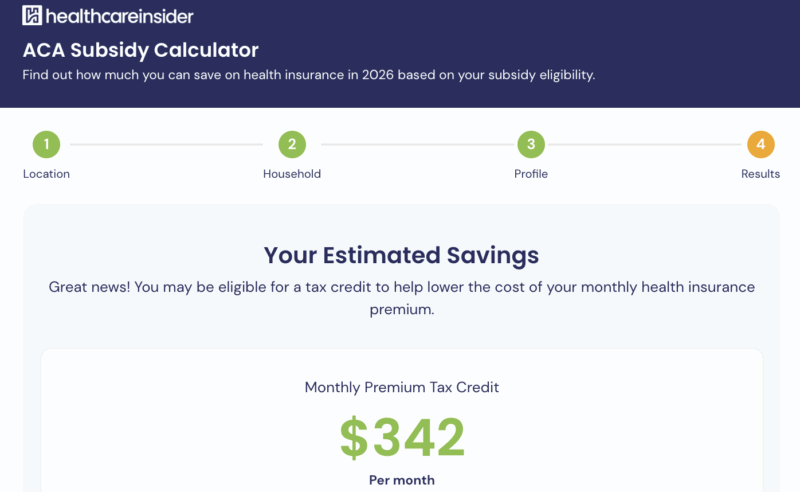Written by Michael LaPick
Healthcare Writer
We want to help you make educated healthcare decisions. While this post may have links to lead generation forms, this won’t influence our writing. We adhere to strict editorial standards to provide the most accurate and unbiased information.
What Is the Individual Mandate?
Starting in 2014, the Affordable Care Act (Obamacare) required all Americans to maintain minimum essential health coverage unless they qualified for an exemption. Those who didn’t comply were subject to an extra tax levied by the IRS when they filed their tax returns. This controversial part of the ACA is officially known as the individual shared responsibility provision. But since it’s a mandate, or requirement, for every person, it’s also known as the individual mandate.
Federal Tax for Not Having Health Coverage Was Eliminated as of 2019
In late 2017, the Tax Cuts and Jobs Act was enacted. It’s a wide-ranging piece of legislation, but one of its provisions was to reduce the tax for not having health coverage to $0, effective after the end of 2018.
This means that you will no longer have to pay a fine to the federal government if you choose to go without health insurance. The individual mandate itself is still in effect, but there is no longer an enforcement mechanism, so it’s essentially irrelevant.
The rest of the Affordable Care Act and its many patient protections remain in effect. But the elimination of the tax associated with the individual mandate is the crux of the Texas v. US lawsuit, in which 20 GOP-led states are working to overturn the entire ACA.
States With Their Own Individual Mandate…
These states have individual mandates with penalties for non-compliance:
- California (effective in 2020)
- Rhode Island (effective in 2020)
- The District of Columbia
- Massachusetts,
- New Jersey, and
- Vermont (Vermont’s mandate takes effect in 2020, but it does not include a penalty for non-compliance, so it’s essentially the same as the current federal mandate).
States That Have Their Own Individual Mandates
Although there is no longer a federal penalty for being uninsured, some states have created their own individual mandates with penalties for non-compliance imposed by the state department of taxation.
2019: Massachusetts, New Jersey, and DC
Massachusetts overhauled its health care system in 2006 — with the state’s health care reform later serving as a model for some of the Affordable Care Act — and has had an individual mandate ever since. From 2014 through 2018, Massachusetts didn’t impose an additional tax on state residents who were uninsured, since they were subject to the federal tax instead. But starting in 2019, Massachusetts reinstated its state-based penalty for non-compliance with the individual mandate.
New Jersey and DC both enacted legislation in 2018 to implement individual mandates starting in 2019, with tax penalties for non-compliance. Residents who weren’t insured in 2019 will have to pay the penalty when they file their state/district tax returns in early 2020.
2020: California and Rhode Island
California and Rhode Island both enacted legislation in 2019 to create state-based individual mandates, effective in 2020, with tax penalties for non-compliance.
Vermont also enacted an individual mandate that takes effect in 2020, but the state has not yet created a penalty for non-compliance. That could still come in a future legislative session, but for 2020, Vermont’s new law simply directs the state to use information from state tax returns to identify uninsured residents and “provide targeted outreach” to help them enroll in affordable health coverage.
Where Does Individual Mandate Penalty Money Go?
The states that have implemented individual mandates are using the penalty revenue to improve overall affordability and access to health insurance and health care.
Rhode Island and New Jersey are using their individual mandate revenue to fund reinsurance programs. California is using it to fund new state-based premium subsidies, Massachusetts uses it to subsidize Health Connector programs, and DC is using the revenue for outreach, enrollment assistance, and various measures that will increase affordability and availability of coverage in the District.
Why Are States Passing New Individual Mandate Laws?
Representatives from these states have explained that individual mandate laws are designed to address not only a public health care concern — ensuring that people continue to have health coverage — but also to keep their health insurance markets (including premiums) more stable.
Because there are so many factors that affect health insurance premiums, it can be difficult to parse out the impact of individual changes. But the projected average individual market premiums for 2020 in California, DC, Massachusetts, New Jersey, and Rhode Island are all lower than the national average; in Massachusetts and Rhode Island they’re the lowest in the country.
In states that don’t have an individual mandate — which includes the majority of the country — the concern is that without a penalty for being uninsured, more people might opt to go without coverage. The Congressional Budget Office estimated in 2018 that over the coming decade, the number of uninsured people would increase by about 8 million people as a result of the elimination of the individual mandate penalty, and the expectation is that most of these people are young and healthy.
These are the individuals who are needed in the insurance risk pool to offset the health care costs of people who are sick: The healthier the risk pool is, the lower the premiums are for everyone, but the sicker the risk pool is, the higher the premiums are. It’s also important to understand that there are few opportunities for uninsured people to enroll in coverage mid-year, making them particularly vulnerable if they end up needing extensive medical care.
The Politics of the Tax Penalty
Obamacare’s individual mandate penalty has been politically divisive since its creation. Republicans generally argue that the law puts lower-income individuals at a financial disadvantage, although the individual mandate includes exemptions for people who are unable to afford coverage, and the ACA includes premium subsidies to make coverage more affordable. Democrats typically insist that the mandate encourages all individuals — healthy or sick — to carry health insurance.
The federal repeal of the penalty for non-compliance with the individual mandate was generally met with support from conservatives. However, some states — mostly Democratic — did not share the same reaction, and either took action to impose their own individual mandates or have considered doing so.
Going Without Coverage in States That Don’t Have an Individual Mandate
If you’re not in California, DC, Massachusetts, New Jersey, or Rhode Island, you won’t face a tax penalty for being uninsured in 2020. But going without coverage means that you’re on your own if and when you end up needing medical care.
Your ability to enroll in an individual market health plan will still be limited to open enrollment or a special enrollment period triggered by a qualifying event. And in most cases, qualifying events can be used to change plans but not necessarily to enroll in a plan if you were previously uninsured.
Your ability to enroll in an employer-sponsored health plan is also limited to your initial eligibility window, your employer’s annual open enrollment period, and special enrollment periods triggered by qualifying events.
So choosing to go without coverage is a risky proposition. If you get seriously ill or injured in March, for example, you may find yourself having to wait until the following January to have health coverage, unless you end up qualifying for coverage under a government program like Medicare or Medicaid. While there are private plans that can be purchased year-round, including short-term health plans and fixed indemnity plans, they generally do not cover any pre-existing conditions and will not be useful in a scenario in which you’re in need of medical care.
Thank you for your feedback!







